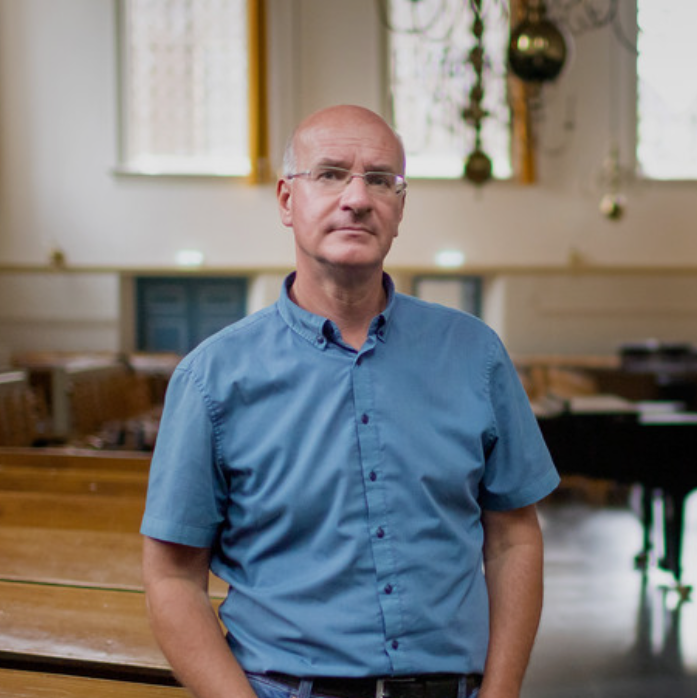 De afgelopen weken heb ik van Robert Webber niet alleen zijn ‘The Divine Embrace’ maar ook zijn ‘Ancient-Future Evangelism’ gelezen. Ondertitel van het boek: ‘Making Your Church a Faith-Forming Community’. Een schitterend boek dat een warm pleidooi voert om evangelisatie en discipelschap weer te doen op de manier van de vroege kerk.
De afgelopen weken heb ik van Robert Webber niet alleen zijn ‘The Divine Embrace’ maar ook zijn ‘Ancient-Future Evangelism’ gelezen. Ondertitel van het boek: ‘Making Your Church a Faith-Forming Community’. Een schitterend boek dat een warm pleidooi voert om evangelisatie en discipelschap weer te doen op de manier van de vroege kerk.
Opvallend is de positieve waardering van de lokale kerk als het om discipelschap gaat. In enkele recent verschenen boeken (‘Oefenruimte’ van Sake Stoppels en ‘Een cultuur van discipelschap’ van Mike Breen) lijkt de lokale kerk het wat te moeten ontgelden als plek om te kunnen groeien in discipelschap (‘Jezus zoekt leerlingen, geen kerkmensen’ en ‘De kerk maakt geen discipelen, discipelen maken de kerk’). Nu begrijp ik dat ook voor een heel groot deel. Tegelijk lijkt het me echt een uitdaging om te zoeken naar antwoorden op de vraag hoe bestaande lokale kerken dé plek kunnen worden waar discipelschapsvorming plaats vindt. Zó was het namelijk in de vroege kerk.
Webber beschrijft in zijn boek hoe de vorming van nieuwe gelovigen er in de vroege kerk uitzag en hoe we dat vandaag kunnen hernemen in de context van de 21e eeuwse cultuur. Daar hoop ik in volgende blogs wat meer over te schrijven. Maar op dit moment wil ik vooral delen dat ik in het boek van Webber een prachtig Statement vond over discipelschap. Vijftien jaar geleden (1999) vond er namelijke in Eastborne (England) een internationale conferentie plaats: de ‘International Consultation on Discipleship’. 450 kerkleiders, 54 landen en 90 christelijke organisaties en denominaties waren bij elkaar om over dit thema te spreken. Dit was de centrale vraag: ‘How can our evangelism produce not only converts but disciples who grow in faith and become active members of the church?’
De conferentie eindigde met een inspirerende slotverklaring waarvan ik geloof dat die ook vandaag een prachtige handreiking biedt om bezig te zijn met de thematiek van evangelisatie en discipelschap in de lokale kerk. Hieronder volgt de Engelse tekst. Als iemand weet of er een Nederlandse vertaling van bestaat, hoor ik dat graag. En anders is er misschien wel iemand die er een Nederlandse vertaling van wil maken?
The Eastborne Consultation Joint Statement on Discipleship
September 24, 1999
When our Lord Jesus was about to ascend into heaven, He commissioned His followers to go and make disciples of all nations, baptizing them, and teaching them to obey everything He had commanded them (Matthew 28:18-20). This comprises the mission given to His people today.
Given that this is our mission, it is of absolute and critical importance that we understand just what Jesus was commanding us to do. Jesus said, “?anyone who does not carry his cross and follow me cannot be my disciple” (Luke 14:27). Thus, Jesus made it clear that true discipleship, at its very core, is a matter of the heart, and a matter of radical submission to His Lordship.
Acknowledgment of the Need
As we face the new millenium, we acknowledge that the state of the Church is marked by a paradox of growth without depth. Our zeal to go wider has not been matched by a commitment to go deeper. Researchers and pollsters have documented the fact that many times:
- Christians are not that different from the culture around them. When the desert wind blows, it shapes the sand, and the Church has become more like the sand than the wind.
- We grieve that many within the Church are not living lives of biblical purity, integrity and holiness. The need is in the pulpit and pew alike.
- The lack of true discipleship has resulted in a lack of power in the Church to impact our culture.
Definition of Discipleship
While there are valid differences of perspective on what constitutes discipleship, we define Christian discipleship as a process that takes place within accountable relationships over a period of time for the purpose of bringing believers to spiritual maturity in Christ. Biblical examples suggest that discipleship is both relational and intentional, both a position and a process. We become disciples by turning from sin through repentance and turning to God through faith. The process of discipleship is played out in a vital life-giving relationship to God that enables us to walk in the light as He is in the light, and do the will of the Father (1 John 1:7; John 4:34). Jesus said if we hold to His teaching, then we are really His disciples (John 8:31), and we demonstrate this through loving one another (John 13:34-35).
The Marks of a Disciple
Although the process of identifying effective discipleship tools or methods is affected by the culture and setting, we affirm that
- the life of a disciple is marked by submission to Christ. Jesus said that we cannot be His disciples unless we give up our very lives (Luke 14:27).
- the marks of true repentance in the life of a disciple are evidenced by ongoing transformation, personal holiness, compassionate service, and the fruit of the Spirit (Galatians 5:22).
We acknowledge that perfection will not be achieved until we see Him face to face. True disciples do fail and are marked by humble repentance in response to personal failure, but recognize God’s forgiveness and restoration in the journey.
Our Commitment
In recognition of the state of the Church and the biblical mandate to make disciples of all nations (Matt. 28:18-20), personally and corporately, we
- call the Church and commit ourselves to preaching the Gospel and making disciples among all peoples in all nations.
- will not water down the cost of discipleship in order to increase the number of converts. We acknowledge that part of making disciples is teaching people to obey everything that Jesus commanded.
- acknowledge that a local church is the primary community within which discipleship should take place.
- will pursue the process of discipleship just as purposefully as the proclamation of the Gospel. Evangelism and discipleship must be seen as integral.
- will strive to submit ourselves to Christ as Lord in every area of our lives, recognizing that we are subjects in the Kingdom of God.
- acknowledge that prayer and worship, study and teaching of the Bible, fellowship in the context of God?s people, and personal accountability are necessary elements of spiritual growth. We recommit ourselves to exercising these disciplines as part of a life of discipleship.
- affirm unreservedly the uniqueness of Christ as the one name under heaven whereby we must be saved, the only mediator between God and man (Acts 4:12; 1 Timothy 2:5-6; John 14:6), but we resist the temptation to define simplistic solutions that suggest there is only on method of growing in Christian maturity.
- recognize that different people and different cultures have different learning and communication styles. We must accommodate those styles in our efforts to make disciples, and address the unique needs of men, women, young people and children.
- commit to follow the model of our Lord who lived His life with His disciples, and affirm the vital role of mentoring in the discipleship process.
- call churches to rigorously assess their existing structures and processes to determine if they provide the most effective means of making disciples.
- commit to beginning the discipleship process as early in life as possible, recognizing that large numbers of people come to faith as children and youth (2 Timothy 3:14-5).
- acknowledge that discipleship resources, including Bibles, are not readily available to large numbers of God?s people in some countries of the world. We commit to doing all we can to make these resources available to those who need them.
- refocus on Christ and Christ-likeness as revealed in Scripture. He is the perfect pattern for our discipleship, and by living as His disciples we bear fruit and bring glory to the Father (John 15:8).
- affirm the role of the Holy Spirit as our teacher, and the One by whom we are led into all truth (John 14:26; John 16:13). The Holy Spirit convicts, guides, and empowers us in the process of discipleship.
- acknowledge the need for our faith in Christ to impact our societies: our families, our workplaces, our communities and our nations, thus becoming salt and light in a dark world (Matt. 5:14-16).





































23/04/2014 op 09:45
Mijn poging om het statement te vertalen:
Vlak voordat onze Heer Jezus werd opgenomen in de hemel, gaf Hij zijn volgelingen de opdracht op weg te gaan en alle volken tot zijn leerlingen te maken, hen te dopen en hun te leren zich te houden aan alles wat Hij hen had opgedragen (Mat 28:18-20). Dit omvat de missie aan Zijn volk vandaag.
Gezien het feit dat dit onze missie is, is het van absoluut en cruciaal belang dat wij begrijpen wat Jezus ons opdroeg te doen. Jezus zei: ‘Wie niet zijn kruis draagt en mij op mijn weg volgt, kan niet mijn leerling zijn’ (Luk 14:27). Jezus maakte dus duidelijk dat echt discipelschap, in z’n diepste kern, een zaak is van het hart, en een kwestie van radicale onderwerping aan Zijn heerschappij.
Erkenning van de noodzaak
Nu wij geconfronteerd worden met het nieuwe millennium, erkennen wij dat de toestand van de kerk wordt gekenmerkt door een paradox van groei zonder diepte. Onze ijver om breder te gaan gaat niet gepaard met een commitment om dieper te gaan. Onderzoekers hebben vele malen gedocumenteerd dat:
• Christenen niet heel anders zijn dan de cultuur om hen heen. Wanneer de woestijnwind waait, vormt dit het zand, en de kerk is meer geworden als het zand dan als de wind.
• We betreuren dat velen binnen de kerk niet het leven van bijbelse zuiverheid, integriteit en heiligheid leven. De behoefte is op de preekstoel en in de kerkbank gelijk.
• Het ontbreken van het ware discipelschap heeft geresulteerd in een gebrek aan kracht in de kerk om onze cultuur te beïnvloeden.
Definitie van discipelschap
Terwijl er geldige verschillen van perspectief zijn over wat discipelschap precies is, definiëren wij discipelschap als ‘een proces dat plaatsvindt binnen relaties waarin verantwoording wordt afgelegd gedurende een langere periode met als doel de gelovigen tot geestelijke volwassenheid in Christus te brengen’. Bijbelse voorbeelden suggereren dat discipelschap zowel relationeel als intentioneel is, zowel een positie als een proces. Wij worden discipelen door weg te draaien van zonde door berouw en ons tot God te keren door geloof. Het proces van discipelschap vindt plaats in een vitale, levengevende relatie met God die ons in staat stelt om in het licht te wandelen zoals Hij in het licht is, en om de wil van de Vader te doen (1 Joh 1:7; Joh 4:34). Jezus zei dat als wij vasthouden aan Zijn leer, we echt Zijn discipelen zijn (Joh 8:31) en we dit laten zien door elkaar lief te hebben (Joh 13: 34-35).
De kenmerken van een discipel
Hoewel het proces van het identificeren van effectieve instrumenten en methoden van discipelschap wordt beïnvloed door de cultuur en de omgeving, bevestigen wij dat:
• Het leven van een discipel gekenmerkt wordt door onderwerping aan Christus. Jezus zei dat we niet Zijn discipelen kunnen zijn tenzij we heel ons leven opgeven (Luk 14:27).
• De kernmerken van ware bekering in het leven van een discipel worden aangetoond door voortdurende transformatie, persoonlijke heiligheid, barmhartige dienstbaarheid en de vrucht van de Geest (Gal 5:22).
We erkennen dat perfectie niet zal worden bereikt totdat we Hem zullen zien van aangezicht tot aangezicht. Ware discipelen zullen falen en worden gemarkeerd door nederige bekering als reactie op persoonlijk falen, maar herkennen Gods vergeving en herstel gedurende de reis.
Ons commitment
In de erkenning van de staat van de kerk en het bijbelse mandaat om alle volken tot leerlingen te maken (Mat 28:18-20)…
• Roepen wij (persoonlijk en gemeenschappelijk) de kerk op en verbinden we onszelf aan de prediking van het evangelie en het maken van discipelen onder alle volken in alle landen.
• Zullen wij niet de kosten van discipelschap afzwakken om zo het aantal bekeerlingen te verhogen. Wij erkennen dat een deel van het maken van discipelen is het mensen leren om alles wat Jezus bevolen heeft te gehoorzamen.
• Erkennen wij dat een plaatselijke kerk de primaire gemeenschap is waarbinnen discipelschap moet plaatsvinden.
• Zullen wij het proces van discipelschap net zo doelgericht nastreven als de verkondiging van het evangelie. Evangelisatie en discipelschap moeten integraal bezien worden.
• Zullen wij ernaar streven onszelf te onderwerpen aan Christus als Heer in elk gebied van ons leven, in het besef dat wij onderdeel zijn van het Koninkrijk van God.
• Erkennen wij dat gebed en aanbidding, studie en leer van de bijbel, gemeenschap in het kader van Gods volk, en persoonlijke verantwoordelijkheid noodzakelijke elementen van spirituele groei zijn. Wij verplichten onszelf tot de uitoefening van deze disciplines als onderdeel van een leven van discipelschap.
• Bevestigen wij zonder voorbehoud de uniciteit van Christus als de enige Naam onder de hemel waardoor wij behouden moeten worden, de enige Middelaar tussen God en mens (Hand 4:12; 1 Tim 2:5-6; Joh 14:6), maar wij weerstaan de verleiding om simplistische oplossingen te definiëren die suggereren dat er maar één wijze van groeien in christelijke volwassenheid is.
• Erkennen wij dat verschillende mensen en verschillende culturen verschillende leer- en communicatiestijlen hebben. Wij moeten tegemoet komen aan deze stijlen in onze inspanningen om discipelen te maken en de unieke behoeften van mannen, vrouwen, jongeren en kinderen aanspreken.
• Verbinden wij ons aan het voorbeeld van onze Heer die Zijn leven leefde met Zijn discipelen, en bevestigen wij de vitale rol van mentoring in het discipelschapsproces.
• Roepen wij kerken op om grondig hun bestaande structuren en processen te evalueren om te bepalen of deze voorzien in de meest effectieve manieren van het maken van discipelen.
• Verbinden wij ons aan het zo vroeg mogelijk in het leven beginnen met het discipelschapsproces, in het besef dat grote aantallen mensen tot geloof komen als kinderen en jongeren (2 Tim 3:14-15).
• Erkennen wij dat discipelschapsmiddelen, waaronder bijbels, niet direct beschikbaar zijn voor grote aantallen van Gods kinderen in sommige landen van de wereld. We verbinden ons aan het doen van alles wat we kunnen om deze middelen beschikbaar te maken voor hen die ze nodig hebben.
• Richten wij ons opnieuw op Christus en Christusgelijkvormigheid zoals geopenbaard in de Schrift. Hij is het perfecte voorbeeld voor ons discipelschap, en door te leven als Zijn discipelen dragen wij vrucht en brengen we eer aan de Vader (Joh 15:8).
• Bevestigen wij de rol van de heilige Geest als onze leraar, en Diegene door wie wij in alle waarheid geleid worden (Joh 14:26; Joh 16:13). De heilige Geest overtuigt, leidt en geeft ons kracht in het proces van discipelschap.
• Erkennen wij de noodzaak van ons geloof in Christus om onze samenleving te beïnvloeden: onze gezinnen, onze werkplekken, onze gemeenschappen en onze landen; kortom om zout en licht in een donkere wereld te worden (Mat 5:14-16).